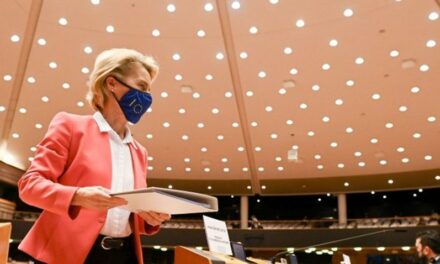Recently, it was announced that the Orbán government will launch the home renovation program.
The construction with a budget of 108.3 billion, realized from EU funds, enables the energetic renovation of approximately 20,000 outdated single-family houses. We asked the national economy minister about the measure before the conference on the competitiveness strategy, and he emphasized that the program fits perfectly with the consistent strategy designated by the prime minister.
"The government's demographic goal is clear: we need to help so that every desired child can be born, that is, there can be as many families with children as possible in Hungary. In order to do this, families and the safety of housing must be protected"
- this is how the Minister of National Economy Márton Nagy summarized for Index that, in accordance with the Prime Minister's decision, the Cabinet announced recently:
a program to support residential building energy modernization is launched.
According to the head of the ministry, the home renovation program fits perfectly into the previous programs, in the framework of which the government helps families with interest-free loans and non-refundable subsidies to renovate and make their homes more energy efficient, thereby contributing to the reduction of utility costs.
The measure affects more than 2 million homes
The announcement was previously evaluated by Attila Juhász, the president of ÉVOSZ's Building Materials Trade Section, as saying that the complete external thermal insulation of an average family house built before the 90s with a floor area of 80-100 square meters can be implemented from the source. Including floor insulation, which combined with window and door replacement can result in an energy efficiency improvement of up to 50 percent.
As an interesting point, he also mentioned that more than 80 percent of the currently more than 4.5 million domestic housing stock was built before 1990 (3.6 million apartments), so the basis for the new subsidy is quite broad. Now, Márton Nagy explained the decision to our newspaper by saying that
A significant part of Hungary's residential buildings, i.e. more than 2 million single-family houses, were built before 1990, and a significant part of them are not up-to-date from an energy point of view.
"The problem with this is that the comfort level of the affected homes is lower, and a significant part of them exceeds the utility limit precisely because of the energy out-of-date. Our measure helps with this, i.e. we provide support so that, for example, by external insulation or replacement of windows and doors, energy consumption is reduced and the energy consumption of the affected families falls below the average level. In this way, it can be ensured that they get energy at an overhead-protected price," said the head of the ministry.
The home renovation program is covered by EU funds, the REPowerEU chapter of the National Recovery and Resilience Plan, in the amount of HUF 108 billion.
"We trust that with the release of EU funds, the money that can be spent on the program will increase. According to our calculations, the 108 billion home renovation program can generate an investment volume of around HUF 130 billion - this is a program that also supports investment - which can significantly contribute to the restart of economic growth"
- concluded Márton Nagy.
It fits into the previous programs
As homes become more modern, the energy consumption of households decreases, which reduces the country's energy demand, so the program is a decisive step in terms of strengthening energy sovereignty, which the government often emphasizes. In addition, the home renovation program also fits into the competitiveness strategy, as its aim is to strengthen the domestic raw materials industry and domestic suppliers.
With the new home creation subsidy, the government expanded the range of subsidies that serve to create a home or renovate homes to 3+1 elements. From January, the village tax is available, which can be applied for the purchase of a new house, the purchase and extension of a used apartment, the modernization and extension of an existing apartment, in the amount of HUF 15 million, depending on the purpose.
Also available from January is csok plus, through which the government provides a maximum HUF 50 million discount loan (in case of three children) nationwide, regardless of settlement type, and can be used for new and used real estate, for purchase, construction and expansion. The third pillar is the just announced home renovation program.
Also available is the Babysitting loan, which can be used even for housing purposes and is basically a free-to-use form of support, through which the government provides a discounted loan of HUF 11 million (which becomes interest-free when a child is born).
7 million forints including the own power
According to the criteria of the program: the support can be used for planned investments in one- and multi-family houses built before 1990, connected to the natural gas network, inhabited according to lifestyle. At the same time, the support is not free: primary energy savings of at least 30 percent must be achieved. This means that more modern and up-to-date homes are created, energy costs decrease, while the energy efficiency and market value of the houses increases. The financing of the planned investment consists of three parts:
• self-reliance provided by the beneficiaries,
• from an interest-free loan
• and non-refundable support.
"If we look at the maximum loan amount and the maximum grant amount, the government contributes a total of HUF 6 million to the renovation of a family's home, which modernization amount is further increased by the self-reliance amount of up to HUF 1 million. The investment value can therefore amount to HUF 7 million, including the loan, support and own funds, within the framework of the home renovation program"
Márton Nagy added. Similar to the Csoc Plus, the non-refundable support is provided by reducing the capital part of the loan.
The amount of interest-free loans and non-refundable subsidies that can be used for a given home basically depends on how the average income in the district where the building to be renovated is located compares to the national average. In districts with a lower than average average income, we provide a larger non-refundable subsidy; in districts with higher incomes and in the case of applicants with high incomes, the amount of non-refundable support is lower.
According to the plans, it will be possible to apply for the home renovation subsidy from June 3 until the end of 2026, but based on the government's preliminary calculations, they expect a lot of interest, both from the population and the construction industry. The program is run by the Hungarian Development Bank and can be applied for at MFB Points of commercial banks. The amount of the loan must be repaid to the beneficiaries within 8 years after its drawdown, "however, we expect that the expected amount of the loan repayment, together with the utility costs saved as a result of the renovation, will not represent a large expense for the households", concluded Márton Nagy.
That's how much you can save on the loan
Owners can save up to HUF 10 million over a decade with the interest-free loan of the home renovation program and the reduction in utilities due to energy efficiency improvement of at least 30 percent, according to the previous compilation of ingtalan.com and money.hu. Compared to market-based loans, property owners thinking about energy modernization can save HUF 4.8-6.8 million in interest and loan repayments with the home renovation program's interest-free loan. Due to the interest-free and post-modernization support, HUF 2.5-3.5 million must be repaid to the bank for the loan. On the other hand, in the case of an 8-year, HUF 6 million free-use mortgage loan, the same amount would be HUF 8.3-9.3 million, their assessment reads.
It can spin the economy
Márton Nagy has emphasized countless times that the government's goal is to restart economic growth this year and further increase it next year. According to the head of the ministry, the home renovation program also helps with this. The measure is an investment support program, which represents an order book of nearly HUF 130 billion for domestic construction material manufacturers and contractors. The Minister of National Economy stated to our newspaper that
if the renovators choose domestic products for the purpose of renovation, this amount can be much higher due to the multiplier effect of the construction industry. According to expectations, up to 60-70 percent of the products needed for the supported activities may come from Hungarian manufacturers.
This was also supported by professional organizations. As we alluded to earlier, according to the analysis of the President of Évosz's Building Materials Trade Section, the Hungarian construction industry was looking forward to this form of support, because it completes the palette launched by csok+ and the solar program. This form of support can positively affect most small and medium-sized enterprises in the construction industry.
Attila Juhász previously stated that the proportion of properties classified as mostly modern or even better does not reach 10 percent, half of the family houses have low energy efficiency, so there are plenty of apartments where the required 30 percent energy efficiency improvement can easily be achieved .
Márton Nagy also touched on the fact that around 20,000 affected homes become more energy-efficient and reduce utility costs,
"thus, more money remains in families' pockets, which they either consume or save, thus helping growth".
Featured Image: Oleksandr Pidvalnyi via Pixabay












